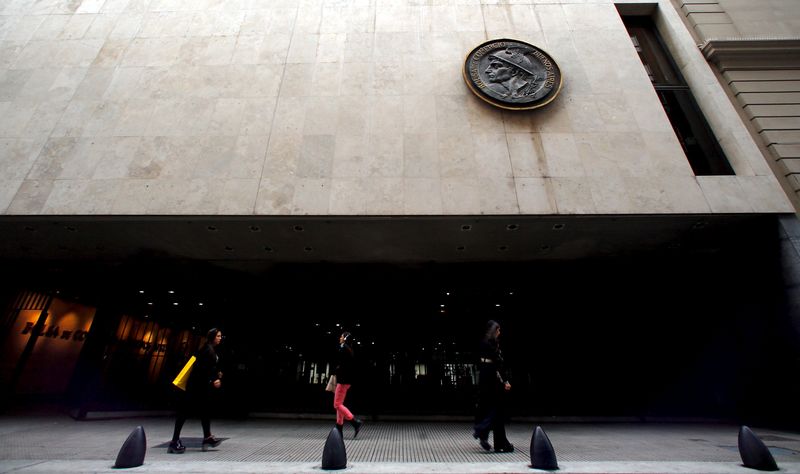By Jamie McGeever
BRASILIA (Reuters) - Latin America's investment climate is gradually deteriorating, with a buildup of recession fears across the region being compounded by market turbulence from the U.S.-China trade war and now a sudden shock of political instability in Argentina.
A mauling for Argentine President Mauricio Macri in Sunday's primary election triggered a historic crash in local assets on Monday, and the tremors were felt across a region whose economic foundations have looked shaky of late.
Just how deep and wide the ripple effects run remains to be seen, and there is a case to be made that, like Venezuela, domestic political turmoil in Argentina should not be too damaging to other economies and markets in the region.
But with the outlook already starting to turn negative, investors may be more inclined to run for cover rather than ride the storm out this time.
The deepening trade conflict between the United States and China had already begun to expose the weaknesses of Latin American economies and financial markets. China is the largest commercial partner for many Latin American countries, which are dependent on trade-sensitive commodities prices.
Official data in the coming weeks will confirm whether Brazil and Mexico, the region's two economic powerhouses, slipped into recession in the first half of this year. Venezuela is mired in economic crisis, and Argentina now looks set to take a sharp turn in that direction.
"Investor confidence is an important channel of contagion, affecting the region," said Martin Castellano, head of Latin American research at the Institute of International Finance in Washington.
"Politics has been a critical driver of investor sentiment since early last year ... (and) an eventual shift in policy direction in Argentina could affect recent efforts to foster intraregional trade, investment, and policy coordination," Castellano said, noting that countries with higher exposure to Argentina via trade and investment, such as Brazil, would be most affected.
Argentina's peso opened down more than 4% on Tuesday, extending its 15% slide in the previous session. On Monday, Argentine stocks (MERV) crashed 30% and yields on the country's sovereign debt soared as investors fretted over the possibility of default.
Brazil's currency on Tuesday was trading below 4.00 reais per dollar for a second day, having passed the key psychological level on Monday for the first time since May. The
BOVESPA benchmark stock index (BVSP) was flat after shedding 2% on Monday.
Mexico's peso slipped 0.2 percent on Tuesday, extending Monday's losses. Its main equities benchmark (MXX) fell 1.2% on Monday. [EMRG/FRX]
According to strategists at Bank of America Merrill Lynch (NYSE:BAC), Latin America was already the emerging region most at risk from the escalating U.S.-China trade war and the yuan's slide to an 11-year low before the surprise in Argentina.
Colombia, Argentina and Mexico are among the most vulnerable countries, they said, thanks to a combination of wide balance of payments deficits, exposure to global economic factors and relatively weak domestic fundamentals.
The Colombian peso is overvalued by as much as 20% on a trade-weighted, real effective exchange rate basis, they estimated.
Tight government budgets in countries like Brazil and Mexico make it more difficult to counter slowing or contracting growth with fiscal policy. Central banks will be wary of cutting interest rates too much for fear of triggering inflation-threatening weakness in their exchange rates.
"LatAm appears as the most vulnerable region not only because of the high exposure to China and commodity prices (and therefore to a worsening of a global slowdown) but also because the tools available to implement counter-cyclical monetary policy are more limited," BAML strategists wrote in a note on Monday.
Analysts at Citi said the spillover to the rest of Latin America should be "fairly orderly," but warned that high-yield credit is particularly vulnerable, while Mexico and Colombia appear to be less resilient to shocks thanks to a weakening credit profile and lower oil prices, respectively.
The gloomy outlook follows the recent burst of investor optimism that the U.S. Federal Reserve will embark on an interest-rate-cutting cycle that, in isolation, would be a positive development for Latin America and give local central banks more room to loosen monetary policy too.
Funds and speculators on U.S. futures markets have increased their bullish bets on the Mexican peso and Brazilian real in recent weeks, according to weekly data from the U.S. Commodity Futures Trading Commission (CFTC).
(GRAPHIC - Mexican peso positioning -CFTC: https://tmsnrt.rs/2MZflAT)
(GRAPHIC - Brazilian real positioning -CFTC: https://tmsnrt.rs/2YL3pdm)
But growth fears are bearing down hard on emerging market currencies and these are now money-lowing bets, which investors may be tempted to reduce even further.
"While we can see some domestic bullish trends in Brazil and Mexico, especially in relation to bond markets, we have turned more cautious," said Jens Nordvig, founder of Exante Data, a New York-based data analytics and market research firm.
"China is crucial to global foreign exchange dynamics. As long as the yuan is responding to tariff escalation from the U.S., it is hard to be bullish on emerging market FX," Nordvig said.
